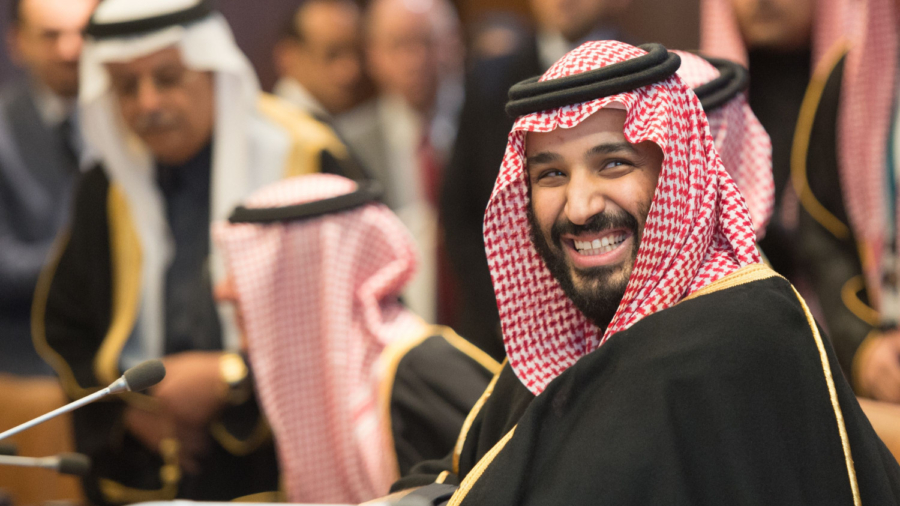RIYADH—Saudi Arabia’s crown prince said in a published interview that both Palestinians and Israelis are entitled to live peacefully on their own land, another public sign of an apparent thawing in ties between the two countries.
Asked if he believes the Jewish people have a right to a nation-state in at least part of their ancestral homeland, Mohammed bin Salman was quoted by U.S. magazine The Atlantic as saying: “I believe that each people, anywhere, has a right to live in their peaceful nation.”
“I believe the Palestinians and the Israelis have the right to have their own land. But we have to have a peace agreement to assure the stability for everyone and to have normal relations,” he told The Atlantic’s Jeffrey Goldberg.
Saudi Arabia – birthplace of Islam and site of its holiest shrines – has never officially recognized Israel. For years, the kingdom maintained that normalizing relations would hinged on an Israeli withdrawal from ‘Arab lands’ captured in the 1967 Middle East war — territory that Palestinians seek for a future state. Prince Salman’s recent remarks mark a shift in the Saudi kingdom’s approach to hopes for achieving peace in the region.
“Our country doesn’t have a problem with Jews … our Prophet Muhammad married a Jewish woman. Not just a friend—he married her. Our prophet, his neighbors were Jewish,” the Crown Prince said.
“There are no problems between Christian and Muslims and Jews. We have problems like you would find anywhere in the world, among some people. But the normal sort of problems.”
Prince Salman said that he held “religious concerns about the fate of the holy mosque in Jerusalem and about the rights of the Palestinian people.”
“This is what we have. We don’t have any objection against any other people,” said Prince Salman, who is currently touring the United States to drum up investments and support for his and other nations’ efforts to contain Iranian influence.
In his remarks, Prince Salman compared the Iranian supreme leader Ayatollah Ali Khamenei to Hitler, “I believe the Iranian supreme leader makes Hitler look good,” Prince Salman said.
“Hitler didn’t do what the supreme leader is trying to do. Hitler tried to conquer Europe … But the supreme leader is trying to conquer the world. He believes he owns the world. They are both evil guys. He is the Hitler of the Middle East. In the 1920s and 1930s, no one saw Hitler as a danger. Only a few people. Until it happened. We don’t want to see what happened in Europe happen in the Middle East. We want to stop this through political moves, economic moves, intelligence moves. We want to avoid war.
“President Obama believed that if he gave Iran opportunities to open up, it would change,” Salman explained. “But with a regime based on this ideology, it will not open up soon. Sixty percent of the Iranian economy is controlled by the Revolutionary Guard. The economic benefits of the Iran nuclear deal are not going to the people.
“They took $150 billion after the deal — can you please name one housing project they built with this money? One park? One industrial zone? Can you name for me the highway that they built? I advise them — please show us something that you’re building a highway with $150 billion.
“For Saudi Arabia, there is a 0.1 percent chance that this deal would work to change the country. For President Obama, it was 50 percent. But even if there’s a 50 percent chance that it would work, we can’t risk it. The other 50 percent is war. We have to go to a scenario where there is no war,” he told Goldberg.
Increased tension between Tehran and Riyadh has fueled speculation that shared interests may push Saudi Arabia and Israel to work together against what they regard as a common Iranian threat.
“There are a lot of interests we share with Israel and if there is peace, there would be a lot of interest between Israel and the Gulf Cooperation Council countries,” Prince Salman added.
Israeli-Palestinian peace talks envisaging a Palestinian state alongside Israel have been frozen since 2014.
Saudi Arabia opened its airspace for the first time to a commercial flight to Israel last month, which an Israeli official hailed as historic following two years of efforts.
In November, an Israeli cabinet member disclosed covert contacts with Saudi Arabia, a rare acknowledgement of long-rumored secret dealings which Riyadh still denies.
Arab officials told Reuters last year that Riyadh appeared to be on board with a broader U.S. strategy for an Israeli-Palestinian peace plan that is still in its early phases of development after U.S. President Donald Trump moved to recognize Jerusalem as the capital of Israel.
Additional reporting by NTD.tv writer Melanie Sun
Recommended Video:

